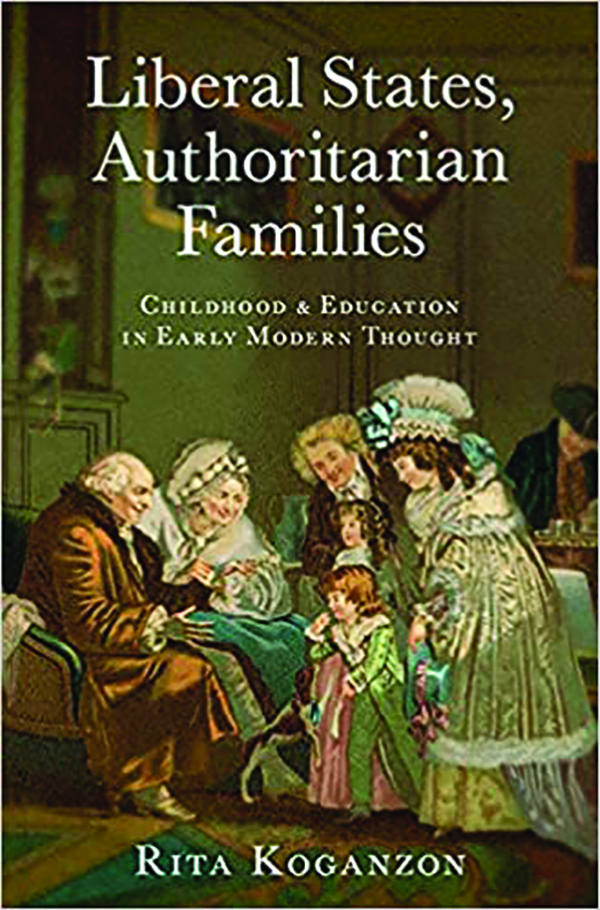For liberalism to flourish, parents cannot be liberal. Families cannot be based on the consent of all of their members. They must instead be founded on the superiority of parents who rule over their children with the aim of orienting them toward the good.

So argues the political theorist Rita Koganzon in her new book, Liberal States, Authoritarian Families: Childhood and Education in Early Modern Thought. What’s more, Koganzon shows that two of the most important theorists of political liberalism, John Locke and Jean-Jacques Rousseau, made exactly this argument in their writings on the education of children. They held that to become autonomous individuals, future citizens need strict educations, ideally provided by their parents. Locke and Rousseau were more or less correct, according to Koganzon, with important implications for not only how we educate our children but also how we understand liberalism.
Koganzon redirects our attention to fundamental features of human existence covered over by liberal cliches. Far from being born equal and free, we come into the world helpless and stupid and remain so for many years. Indeed “we” do not come into the world at all. Our personalities only appear in time, as other people initiate us into language and culture. Children require not only adult supervision to stay out of physical danger but also, in an apparent paradox, adult intervention to acquire psychological independence. We are able to reflect and make choices about who we want to be only because earlier in our lives, adults used their authority to impose a way of life on us. In the best cases, they initiated us into a culture sufficiently complex that it allowed us, as we mastered it, to develop a personal understanding of the world and to evaluate what others tell us — to question or reject it or to take it up after reflection, responsible for our choice.
Helping us reconsider these basic aspects of what it is to be a human being, Koganzon also sketches a defense of homeschooling and private education. While some critics argue that public education is necessary to pry students out of the prejudiced, limited domain of the family, Koganzon finds, through her reading of Locke and Rousseau, powerful counterarguments. She holds that a liberal society requires citizens to have developed the ability to make up their own minds and create their own lives. To do so, they must have been initiated into a specific worldview and life model by their parents. Only after they have been shaped by these diverse backgrounds can individuals confront each other in an exchange of views among equals. Universal public education, and indeed the whole drift of contemporary liberalism, tends to eliminate this diversity by depriving parents of their due authority.
Liberal States, Authoritarian Families is not a restatement of the pessimistic arguments of paleoconservatives and “post-liberals” who claim that liberalism lacks the moral resources to sustain itself. These writers hold that liberal societies must inevitably degenerate as their members lose faith in the Christian tradition that birthed such liberal ideals as equality, universalism, and freedom of conscience. According to Koganzon, however, liberalism is not on a long trajectory of decline. It is instead subject to periodic crises arising from its basic internal contradictions. These are not inevitably fatal and can be contained, provided we understand them.
Liberalism is a set of political principles by which people can live together at a large scale. It tells us to see other people as morally equivalent to ourselves, subject to identical rights and responsibilities by virtue of their being fellow citizens of the state. But as Koganzon reminds us, there is a contradiction between this political vision of other people as interchangeable citizens and our actual experiences of other people, none of whom ever strike us as quite identical to one another.
Our private relationships can only be brought into accordance with liberal norms of equality by degrading those relationships. I have elsewhere argued that the concept of “lived experience” can be a critical tool for conservatives and liberals seeking to push back against the demands of contemporary identity politics. By consulting our lived experience of family, dating, and marriage, for instance, we may find illiberal elements of inequality, authority, and obligation that are inseparable from these relationships’ flourishing and our flourishing within them.
Although it may sound reactionary to suggest that private life is and ought to be structured by values at odds with our public political commitment to equality, the thought is not a specifically conservative one. Indeed, one of the few weaknesses of Koganzon’s book is that it shows little effort to engage with one of the most important 20th-century traditions of thinking about the family and morality: the Frankfurt school of critical theory. Its members warned that modern societies are undergoing what the philosopher Jurgen Habermas described as the “colonization of the lifeworld”: the subjection of private life, including the family, to the same stifling demands as work, school, and other institutions now characterized by competition and conformity.
Writing after World War Two, Frankfurt school philosopher Theodor Adorno drew a connection between the “authoritarian” bourgeois family and the rise of Nazism. But in subsequent years, both Adorno and his colleague Max Horkheimer warned that the decline of paternal authority in families and schools risked depriving children of the cultural resources necessary for independent thinking as adults. In a similar spirit, Matt Feeney, a conservative versed in critical theory, has recently described how American families raising collegebound children are evermore beholden to the demands of college admissions boards. In this, as in a number of other areas, the work of the Frankfurt school may be an intellectual arsenal for those on the Left and the Right seeking to save liberalism from its own excesses.
Blake Smith is a historian of modern France and a literary translator.
